|
|
|
Sort Order |
|
|
|
Items / Page
|
|
|
|
|
|
|
| Srl | Item |
| 1 |
ID:
060997
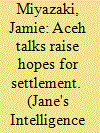

|
|
|
| 2 |
ID:
059155
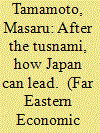

|
|
|
|
|
| Publication |
Jan-Feb 2005.
|
|
|
|
|
|
|
|
|
|
|
|
|
|
|
|
| 3 |
ID:
060723


|
|
|
| 4 |
ID:
157573
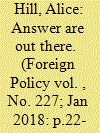

|
|
|
| 5 |
ID:
109035
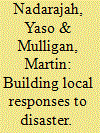

|
|
|
|
|
| Publication |
2011.
|
| Summary/Abstract |
While there has been much discussion in international disaster management literature in recent years of the need to give affected communities much more 'ownership' of recovery and rehabilitation pro-jects and programs, there is little real understanding of what this might mean in practice. There are many calls for post-disaster recovery programs to reduce vulnerability to future risks, or to 'build back better'. Drawing from an intense study of social recovery and community rebuilding across five tsunami-affected local areas in Sri Lanka and southern India, this article affirms the need for greater community 'guidance' of disaster recovery but it argues that different forms of community engagement are required for different stages in the long process from relief to recovery. It argues that 'build back better' is possible, but only if aid and other related agencies work more closely with existing capacities for resilience within the affected communities and contribute towards their legitimacy.
|
|
|
|
|
|
|
|
|
|
|
|
|
|
|
|
| 6 |
ID:
094760


|
|
|
|
|
| Publication |
2010.
|
| Summary/Abstract |
This article investigates the security-development nexus through a study of local experiences in a neighbourhood in Sri Lanka's capital Colombo. As the Sri Lankan state struggles to secure 'the nation' from 'terrorism', and to develop it towards a twin vision of modernization and return to a glorious past, large parts of the population in Colombo 15 remain at the margins of this 'nation'. They are ethnic and religious minorities, forgotten tsunami victims, terrorist suspects and unauthorized dwellers - those often depicted as threats to, rather than subjects of, 'security' and 'development'. This study reveals that the security-development nexus constitutes a complex web of linkages between factors related to housing, income, tsunami reconstruction, party politics, crime, political violence and counter-violence, social relations, and religious beliefs and rituals. People's perceptions of and opportunities to pursue security/development are intimately linked to their position as dominant or marginalized within 'the nation', 'the community' and 'the family'. 'Security' and 'development' issues are mutually reinforcing at times, but just as often undermine each other, forcing people to make tough choices between different types of security/development.
|
|
|
|
|
|
|
|
|
|
|
|
|
|
|
|
| 7 |
ID:
072299


|
|
|
|
|
| Publication |
2006.
|
| Summary/Abstract |
One means of curbing anti-Americanism is to promote positive views of the United States and its people. The purpose of this study was to assess whether nearly a billion dollars pledged by the United States for tsunami aid instilled good will among Sri Lankans. Of 478 respondents, most considered both the American government (75%) and the American people (84%) to be generous. Half claimed that they liked the American people, a substantial increase over attitudes measured 2 years back, post-9/11. While fewer than half supported U.S. involvement in Iraq, the extent of this support increased significantly from post-9/11 levels, suggesting that humanitarian aid may result in broadened support for unrelated U.S. initiatives.
|
|
|
|
|
|
|
|
|
|
|
|
|
|
|
|
| 8 |
ID:
132494
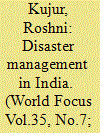

|
|
|
|
|
| Publication |
2014.
|
| Summary/Abstract |
Development and welfare of human beings is intimately related to the natural environment. Normally, environment is a source of livelihood but at times due to the intensive intervene made by human it brings
hazards like earthquake, cyclone, ?ood, landslide etc. further these hazards turns into disasters causing losses of life and property.' These hazards can be minimized by using modern scientific and technological
advancements. Disaster is a sudden adverse or unfortunate extreme event which causes great damage to human beings as well as plants and animals. Disasters I occur rapidly, instantaneously and indiscriminately which wipe out the years of development in a matter of hours. Disaster may be natural or man-made chaos and destruction reigns everywhere. It doesn't only justify initial death and damage occurrence but even the post-disaster tranquility and sufferings that too without any doubt regenerate pain and misery. Around 76% of India's coastline is prone to cyclones and tsunamis, while 59% of the country is vulnerable to earthquakes, 10% to-?oods and river erosion, and 68 %_to droughts? This has been stated by National Policy on Disaster Management that, "Disaster disruptsprogress and destroys the hard earned fruits of painstaking developmental efforts, often pushing nations, in to the quest for progress, back by several decades. Thus ef?cient management of disasters rather than mere response to their occurrence has in recent days received increased attention both in -India and abroad. This is as much a result of the recognition of the increasing frequency and intensity of disasters as it is an acknowledgement that good governance, in a caring and civilized society, needs to deal effectively with the devastating impact of disasters?"
|
|
|
|
|
|
|
|
|
|
|
|
|
|
|
|
| 9 |
ID:
107916
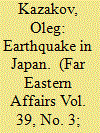

|
|
|
| 10 |
ID:
108878
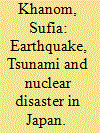

|
|
|
|
|
| Publication |
2011.
|
| Summary/Abstract |
This paper attempts to assess the impacts of the devastating natural disaster - earthquake followed by tsunami, that shook Japan on 11 March 2011, from socio-economic and development point of view. The intensity of the disaster was reflected through a destructive earthquake measuring 8.9 on Richter scale along with a tsunami at a speed of 500 miles/hour. Though, Japan is technologically and economically developed, it described the disaster as the worst crisis in the 65 years of its history since the end of World War II. Huge humanitarian crisis and massive disruption of industrial supply chains negatively affected the economic growth of Japan and put enormous stress on the psyche of Japanese people. The plight of the people had been compounded further by the threat of radiation exposure from the damaged reactors of nuclear power plants at Fukushima. The mishap at nuclear power plants at Fukushima posed some serious questions to the world: how safe nuclear power plants really are? Should the world look for a safer alternative to power problems? The disaster in Japan and its consequences have some serious impacts on Bangladesh from a development perspective. Japan has long been the principal donor and biggest development partner of Bangladesh. But the ongoing crisis in Japan may pose a threat or create some degree of uncertainty to the long term development planning of Bangladesh. Besides, the catastrophic experience of Japan has made Bangladesh rethink about its readiness to encounter similar disasters. As a climate induced vulnerable country, Bangladesh should strengthen its disaster management system by ensuring early warning system, as well as improving rescuing and relief management mechanism to combat such natural calamities.
|
|
|
|
|
|
|
|
|
|
|
|
|
|
|
|
| 11 |
ID:
111761
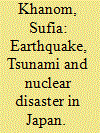

|
|
|
| 12 |
ID:
102715
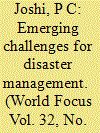

|
|
|
| 13 |
ID:
113795
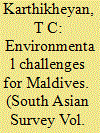

|
|
|
|
|
| Publication |
2010.
|
| Summary/Abstract |
This article looks into the environmental challenges that Maldives, an island country in the South Asian region, is facing. It studies all possible sources of environmental challenges with inherent vulnerabilities of the country in terms of its geographic and environmental conditions, and analyses important contributing factors such as global warming, sea level rise, tourism and environmental degradation and, more importantly, the 2004 tsunami. The article particularly examines the effects of global warming on Maldives on the basis of the Intergovernmental Panel on Climate Change's (IPCC) report on climate change. The impact of the tsunami and its repercussions on the Maldives's ecological fragility are also discussed. Towards the conclusion, this article focuses on the need of the Maldivian government to formulate appropriate policies and also, at the same time, the difficulties in realising those policies.
|
|
|
|
|
|
|
|
|
|
|
|
|
|
|
|
| 14 |
ID:
109031
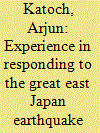

|
|
|
| 15 |
ID:
157793
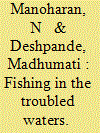

|
|
|
|
|
| Summary/Abstract |
India’s relations with its neighbours in the maritime domain have received less scholarly attention. Those studies that deal with India’s relations with its South Asian neighbours generally touch on political security, socio-cultural and economic issues. The maritime aspect is either ignored or tucked in as a part of other dimensions. The present study attempts to fill the gap in the literature by taking up the case of Sri Lanka. Sri Lanka is chosen as a case, not only because the island state is India’s closest maritime neighbour but also due to the existence of deep interactions between the two countries in diverse fields both at governmental and non-governmental levels. In the maritime domain, in the present context, technically speaking, there is no problem between the two countries. However, the fishermen issue remains one of the issues principally because of the Tamil Nadu factor. Analysing the issue in five phases, the study argues for a ‘comprehensive approach’ for its settlement.1
|
|
|
|
|
|
|
|
|
|
|
|
|
|
|
|
| 16 |
ID:
130984
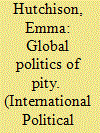

|
|
|
|
|
| Publication |
2014.
|
| Summary/Abstract |
The study of emotion has become a steadily growing field in humanitarian actions. This essay adds to the field through a further empirical examination of the political roles emotions can play. Specifically, the essay questions how emotions were implicated in the construction of transnational solidarity-and the associated humanitarian actions-following an event of pivotal global importance: the Asian tsunami disaster of December 2004. To this end, I focus on the emotional dimensions of dominant media tsunami imagery and examine how emotions helped to produce the humanitarian meanings and ideologies on which the subsequent solidarity and humanitarian actions were based. Analyzing photographs in the New York Times, the essay demonstrates that the dominant tsunami imagery helped to evoke solidarity and garner aid. It did so, at least in part, through mobilizing stereotypical and deeply colonial representations of developing world disaster that are suggestive of a "politics of pity." In this way, the essay contributes both an empirical study of emotions in world politics and an examination of the linkages between emotions and contemporary humanitarianism.
|
|
|
|
|
|
|
|
|
|
|
|
|
|
|
|
| 17 |
ID:
114016
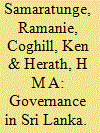

|
|
|
|
|
| Publication |
2012.
|
| Summary/Abstract |
This article applies complex evolving systems theory (CES) to investigating the governance factors affecting rebuilding in the wake of the 2004 tsunami in Sri Lanka. It also examines the crucial processes of co-operation between the various governance actors (public, market and civil society) in the aftermath of the disaster. The main focus is on the horizontal integration in the process of service delivery at the district level during the rebuilding stage, and on explaining the nature and extent of collaboration in the delivery of services needed for the survivors to build their new lives. Our observations suggest that influence, incentives and the power of dominant groups remain highly relevant to the outcomes and that the socio-political system within which they operate is dynamic. Governance as a whole has become a playing field for dominant stakeholder groups both within and outside the government. The study demonstrates the value of CES in improving the understanding of complex governance in the context of a crisis.
|
|
|
|
|
|
|
|
|
|
|
|
|
|
|
|
| 18 |
ID:
151734
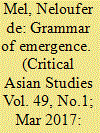

|
|
|
|
|
| Summary/Abstract |
This essay studies the impact of the 2004 Asian Tsunami on a marginalized ethnic community of Burghers in Batticaloa, Eastern Sri Lanka. Through a case study of the displacement and re-settlement of Burgher women, their role in a cooperative society, and property ownership strategies, the essay argues that while gender positions may not have altered significantly at the macro level, changes have occurred at a micro-political level, and that these “small changes from below” mark the emergence of the women as a political community. It also points to the need, if these transformative practices are to be deepened and sustained, for developmental actors such as the state and international donors to recalibrate their approaches to rural women. This includes placing greater value on local social practices such as matrilineal inheritance that favor women in Eastern Sri Lanka.
|
|
|
|
|
|
|
|
|
|
|
|
|
|
|
|
| 19 |
ID:
083621


|
|
|
|
|
| Publication |
2008.
|
| Summary/Abstract |
Abstract: Drawing on field work in Southern Thailand undertaken in July 2005, the study illuminates the complex and contingent way in which the Indian Ocean tsunami of December 2004 affected communities, households and individuals. The paper problematises the indiscriminate/discriminate patterning of impact and recovery and also makes a case for a delocalised and transnational approach to understanding the impacts of the wave. Using the notion of 'tsunami footprints' and drawing on qualitative interviews, the paper proposes that impacts need to be seen in the context of the spatially dispersed networks of association that characterise the Thai space economy and Thai society. Drawing on work on poverty dynamics, the paper also explores three explanatory disjunctures in recovery transitions: the disjuncture between the pre-tsunami context and the post-tsunami situation; the disjuncture between structure and agency; and the disjuncture between the appearance of progressive and gradual change in societies and the lived reality of turbulence
|
|
|
|
|
|
|
|
|
|
|
|
|
|
|
|
| 20 |
ID:
084422


|
|
|
|
|
| Publication |
2008.
|
| Summary/Abstract |
Abstract: Drawing on field work in Southern Thailand undertaken in July 2005, the study illuminates the complex and contingent way in which the Indian Ocean tsunami of December 2004 affected communities, households and individuals. The paper problematises the indiscriminate/discriminate patterning of impact and recovery and also makes a case for a delocalised and transnational approach to understanding the impacts of the wave. Using the notion of 'tsunami footprints' and drawing on qualitative interviews, the paper proposes that impacts need to be seen in the context of the spatially dispersed networks of association that characterise the Thai space economy and Thai society. Drawing on work on poverty dynamics, the paper also explores three explanatory disjunctures in recovery transitions: the disjuncture between the pre-tsunami context and the post-tsunami situation; the disjuncture between structure and agency; and the disjuncture between the appearance of progressive and gradual change in societies and the lived reality of turbulence.
|
|
|
|
|
|
|
|
|
|
|
|
|
|
|
|
|
|
|
|
|